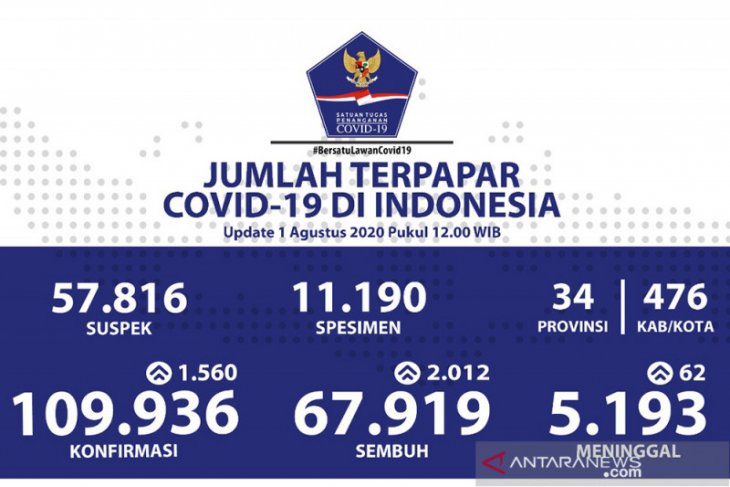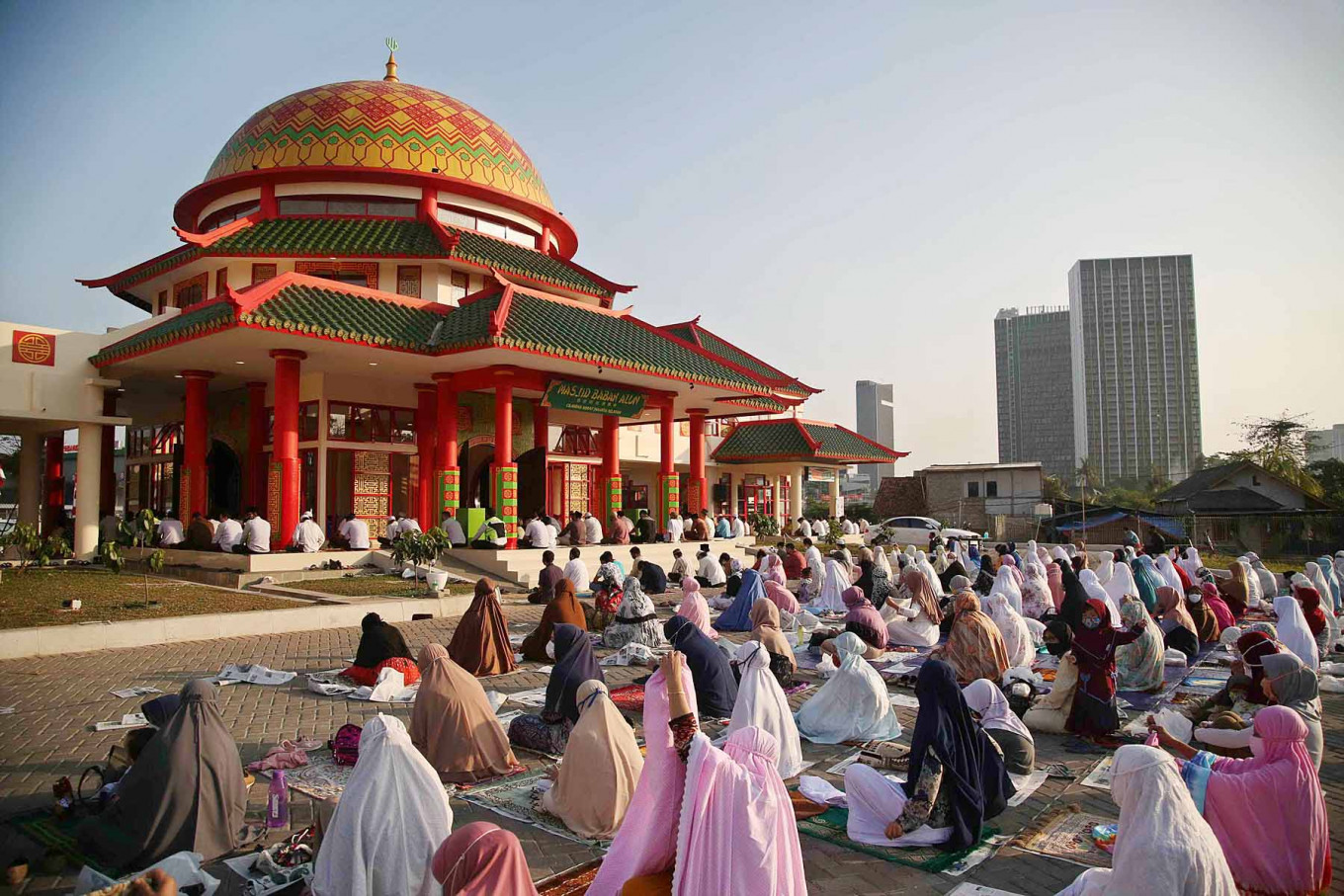Live Streaming
Program Highlight
Company Profile
August
Indonesia Registers 1,560 Fresh COVID-19 Cases, 2,012 Recoveries
Written by Ani Hasanah
Indonesia recorded 1,560 fresh cases, while 2,012 people recovered from the coronavirus disease (COVID-19) on Saturday noon, August 1, 2020. (COVID-19 Handling Task Force)
Indonesia recorded 1,560 fresh cases, while 2,012 people recovered from the coronavirus disease (COVID-19) on Saturday noon, according to the COVID-19 Handling Task Force.
The country's tally of COVID-19 cases rose to 109,936, including a total of 67,919 recoveries since President Joko Widodo (Jokowi) made an announcement of Indonesia's first confirmed cases on March 2, 2020.
The number of people succumbing to COVID-19 surged by 62, thereby bringing the death toll to 5,193.
A total of 11,190 specimens from 9,355 people were examined at 320 laboratories across Indonesia on Saturday noon, thereby bringing the total number of specimens examined to 1,517,381 from 875,894 people.
Jakarta was the province, with the highest number of fresh cases, reaching 368; followed by 235 cases in East Java, 143 cases in Central Java, 142 cases in Gorontalo, and 130 cases in South Sulawesi.
Meanwhile, Jakarta emerged as the province, with the highest number of recoveries, reaching 679 people; followed by 462 people in East Java, 301 in Central Java, 131 in North Sumatra, and 82 in South Kalimantan.
The eight provinces of Aceh, Bangka Belitung, West Kalimantan, West Nusa Tenggara, West Sumatra, Central Sulawesi, Lampung, and East Nusa Tenggara reported no new confirmed cases.
The number of suspects still under monitoring reached 57,816, while 109,936 people were under surveillance.
The COVID-19 pandemic originated in Wuhan, China, in late 2019.
As of Saturday, a total of 17,793,829 people worldwide were infected with the virus, and the death toll had reached 683,797.
The coronavirus outbreak is affecting 213 countries and territories across the world and two international conveyances. (ANTARA)
August
Indonesia Urges People to 'come out of their homes' to Boost the Economy amid Covid-19
Written by Ani Hasanah
The Indonesian government has urged people to "come out of their homes" to boost the economy, warning that there are limits to what state coffers can do amid the Covid-19 pandemic.
"The economic activity has drastically been reduced, as many do not dare leave home, as they avoid meeting others physically. Meanwhile, virtual activities - in place of the usual physical contacts - have not adequately fuelled the economy," said Budi Sadikin, head of the economic recovery task force in the government's Covid-19 response team.
"If we continue to remain in (partial) lockdowns, our fiscal space would no longer be sustained," he added.
Budi's appeal on Wednesday (July 29) comes as it appears the country could be heading for a recession with a second quarter of negative growth. The forecast is for growth in the April to June quarter to be at least minus 3 per cent.
The government has set aside 695 trillion rupiah (S$66.8 billion), or about 4.2 per cent of the country's gross domestic product, to mitigate the impact of the pandemic which has led to millions of job losses.
Despite struggling to curb the spread of Covid-19, cities and provinces across the sprawling archipelago have gradually eased restrictive measures imposed as part of partial lockdowns. The world's fourth-most populous country, with 270 million people, declared its first infections in early March.
The overall number of infections in Indonesia totalled 104,432 as of Wednesday, with fatalities reaching 4,975. Both figures are the highest in South-East Asia.
Offices in the capital of Jakarta started to reopen in the first week of June, with workers put on a staggered roster and going to the office on alternate days. They have also been told to avoid crowding at meal times and in lifts. Shopping malls were also allowed to reopen in mid-June.
Bali, Indonesia's tourism hot spot, is due to reopen on Friday to domestic tourists and to foreign tourists possibly on Sept 11.
A slew of strict protocols has been put in place, including requiring visitors to show proof that they tested negative for Covid-19. would be required. The planned reopening to foreign tourists is subject to approval from Jakarta.
While stressing the need for strict health safeguards, Budi on Wednesday reassured people about going about their normal business.
"Doctors today know better how to treat patients, so chances of recovery have much improved. They have higher therapeutic standards, health protocol standards and antiviral drugs are widely available," he said.
"A hundred years ago, 100 per cent of dengue patients didn't make it. Today, if we get dengue, we may recover. This is not because of a vaccine, but better therapeutic standards," he added.
Government data shows the recovery rate of Covid-19 patients in the country rising to above 40 per cent in July, from 37 per cent, 22 per cent, 10 per cent and 4 per cent in the previous four months respectively.
Epidemiologist Pandu Riono, who teaches at the faculty of public health at the University of Indonesia, remained sceptical about encouraging people to enter a "new normal", saying that this could only be possible with increased surveillance and strict health protocols - the wearing of a mask, frequent hand washing and social distancing - in place.
"Key to surveillance is massive testing, contact tracing and isolating cases. We need to have 100,000 tests per day to contain the pandemic. If we don't achieve this, we may still see cases climb next year," Dr Pandu told The Straits Times.
Between 20,000 and 30,000 polymerase chain reaction (PCR) tests are currently taken every day. (The New Straits Times/Asian News Network)
August
Tests Reveal Increase in COVID-19 Clusters in Jakarta's Houses of Worship
Written by Ani Hasanah
Praying under protocol: Muslims attend an Idul Adha (Day of Sacrifice) prayer at Babah Alun Mosque in Cilandak, South Jakarta, on July 31. (JP/P.J. Leo)
More than half of the people tested for COVID-19 at houses of worship were found to have the disease, health authorities have revealed.
According to epidemiologist Dewi Nur Aisyah of the national COVID-19 task force, the positivity rate in houses of worship has reached 74 percent, up from 51 percent, tempo.co reported.
The positivity rate refers to the percentage of positive results of from all tests conducted in a cluster.
Jakarta Health Agency data from June 4 to July 28 shows there were 114 confirmed cases from nine houses of worship clusters across the capital. Most of them were located in churches and mosques, with three clusters each and a total of 40 cases.
Meanwhile, health authorities recorded one cluster in a clergy dormitory, pesantren [Islamic boarding school] and tahlil (Islamic prayers of the dead), with a total of 74 cases.
“The positivity rate likely [increased] because people kept gathering in one place, such as in a clergy dormitory,” Dewi said on Friday as quoted by tempo.co.
During its transition from large-scale social restrictions (PSBB), the capital determined five types of COVID-19 clusters, namely houses of worship, residential areas, markets, office and health facilities.
Governor Anies Baswedan extended the transitional PSBB for another two weeks starting on Friday after Jakarta failed to slow down the daily increase in COVID-19 cases. The capital’s positivity rate hit 6.5 percent in the past week, above the figure recommended by the World Health Organization for relaxations, which is 5 percent or below.
The city’s latest COVID-19 daily reproduction number (Rt) also stood at 1. An outbreak is considered under control if the number is below 1. (aly) (The Jakarta Post)
August
United States Recession Weakens Rupiah
Written by Ani Hasanah
The movement of the Rupiah at the spot market during the opening of the trade session is predicted to remain weak at level of IDR 14,650 on Monday, August 3, 2020. The weakening of the Rupiah is predicted to be affected by an external factor, which is the economic recession in the United States.
"Until July 31, there have been a number of countries hit by recession starting from Singapore, Hong Kong, South Korea, Australia, and then German and finally the United States. This possibility affects our Rupiah which will open weak next week," said the Director of TRFX Garuda Berjangka Ibrahim on Friday, July 31, 2020.
Ibrahim said that the United States recession raises concerns over the possible increase of unemployment in the country, which may strengthen the US Dolar index. In such condition, most foreign currencies face uncertainty.
Moreover, the United States controls 20 percent of the global economy, for Indonesia, the United States recession presents a major drawback because the United States is Indonesia's main export destination other than China.
Meanwhile, the internal factor that hampers the Rupiah movement is the extension of the Large-Scale Social Restriction ("PSBB") transition period imposed by the Jakarta Government. "If it is extended until August, it will be dangerous. If the PSBB transition period continues, Indonesia's Gross Domestic Product will be negative in the third quarter,"
The extension of PSBB transition period, according to Ibrahim, will raise apathy in the market. Ibrahim added that there is a possibility for the Rupiah exchange rate against the US Dolar will decrease sharply to IDR 15,000. (tempo.co)


